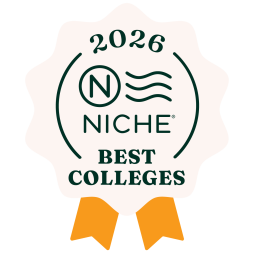
BS in Civil Engineering Degree
Give Back to Your Community with a Bachelor’s Degree in Civil Engineering
Civil engineers design, build, and maintain many of the things we use every day, like roads, bridges, seaports, airports, railways, pipelines, and buildings. If that sounds like something you’d enjoy doing, Liberty’s Bachelor of Science (BS) in Civil Engineering degree program is crafted to help you prepare to pursue a job where you may work on projects like these. At Liberty, we blend cutting-edge engineering principles with a Christian perspective, giving you a unique educational experience.
A BS in Civil Engineering is more than just a degree; it’s a gateway to making substantial, positive impacts on communities. You could go on to work for a private company, the military, or the government, among other employers. By studying civil engineering at Liberty University, you can learn how to design and construct public facilities that benefit your community.
Civil engineers are often pivotal in designing, constructing, and maintaining vital infrastructure like roads, bridges, and transportation systems. This work can directly enhance community connectivity, accessibility, and mobility, leading to economic growth and improved quality of life.
Additionally, as a civil engineer, you could impact public health through the thoughtful design of water supply and sewage systems. Through these efforts, you can potentially reduce the spread of diseases and create safer living environments.
Civil engineering is one of the oldest engineering professions, and it plays a vital role in our society. By pursuing a BS in Civil Engineering, you’re not just preparing to pursue a career; you’re equipping yourself with the knowledge and skills to build stronger, safer, and more sustainable communities. Partner with us and prepare to help your community grow, thrive, and flourish.
Credit Hours
View CoursesNext start date: Aug 24, 2026

ABET Accredited
Highlights
Highlights of Our Bachelor of Science in Civil Engineering
Build a Strong Foundation in Civil Engineering
Liberty University’s BS in Civil Engineering can help equip you with technical skills and hands-on experience to design and construct infrastructure that shapes communities, from roads and bridges to water systems and buildings.
Hands-On Learning with Cutting-Edge Technology
Gain real-world experience in modern labs and design studios, working with industry-standard software and materials testing equipment to prepare to pursue careers in structural, environmental, and transportation engineering.
Opportunities for Research and Collaboration
Engage in faculty-led research projects, internships, and collaborative team design challenges, allowing you to apply classroom knowledge to solve real engineering problems.
Christ-Centered Approach to Engineering Excellence
Prepare to make a lasting impact with an education that integrates faith and ethics in engineering, equipping you to design solutions that serve communities with integrity and innovation.
Career Potential
What Can You Do with a Civil Engineering Undergraduate Degree?
Liberty University’s Bachelor of Science in Civil Engineering can help prepare you to pursue the following occupations:
- Construction manager
- Design engineer
- Environmental engineer
- Geotechnical engineer
- Project manager
- Surveyor
- Transportation engineer
- Urban planner


#2 Best College Campus in America
At Liberty, you’ll find an affordable, high-quality education designed to help equip students like you for the real world. Our commitment to excellence has earned us recognition as the #2 Best College Campus in America by Niche.com for 2026.
Earning your degree from a nonprofit university with state-of-the-art resources like ours can help set you apart from your peers.
Courses
What Will You Study in Liberty University’s Bachelor-Level Civil Engineering Classes?
Whether you’re looking to launch your civil engineering career or prepare for graduate school, our program is here to help with your next step. In this program, you can study how to plan, design, build, and maintain facilities that form the backbone of the world’s economy – from highways and airports to sewage systems and dams.
Some of the topics you’ll explore include statics, dynamics, fluid mechanics, engineering design, surveying, computer-aided design, and structural analysis. You’ll receive a general introduction to engineering as well as specialized training in civil engineering. Within the lab courses, you will analyze the strength of various civil engineering materials and explore wastewater treatment.
Civil engineers often need to navigate financial costs, environmental concerns, and government regulations, among other issues. In this program, you can study how to handle these challenges and develop durable facilities that can withstand the test of time. Our civil engineering courses provide an in-depth look at structural, geotechnical, transportation, and construction engineering. That way, you can develop a broad base of knowledge and pursue many types of civil engineering jobs.
Featured Civil Engineering Undergraduate Courses
ENGV 225 – Surveying
ENGV 365 – Hydraulic Engineering
ENGV 380 – Project and Construction Management
ENGV 410 – Transportation Engineering
Degree Information
- This program falls under the School of Engineering
- View the Degree Completion Plan
- Check out our course catalog
- Transfer in up to 75% of the degree total
ABET Accreditation
The Civil Engineering program is accredited by the Engineering Accreditation Commission(s) of ABET, https://www.abet.org, under the General Criteria and the Program Criteria for Civil and Similarly Named Engineering Programs.*
*ABET accredits postsecondary degree-granting programs housed within regionally accredited institutions. They accredit programs only, not degrees, departments, colleges, or institutions.

BENEFITS
Why Choose Liberty’s BS in Civil Engineering Degree Program?
Capped Class Size, not Student Potential
You won’t be just another face in the crowd at Liberty. Our civil engineering classes are intentionally capped at 24 students, giving you the chance to form real connections with your professors.
This personalized approach can help you better grow to understand complex concepts as well as receive guidance tailored to your goals. It also creates space for more interactive learning and project-based collaboration.
Join a Community of Future Engineers
At Liberty, you can become part of a student body that values collaboration and innovation. Civil engineering students can get involved in clubs like the Civil Engineering Student Club, the Technology and Engineering Club, and the Engineering Missions and Research Club.
These organizations provide opportunities to build leadership skills, expand your network, and work on meaningful team projects. Whether you want to compete, serve, or research, you can find a place to thrive.
Train in Industry-Ready Facilities
Our 7,000-acre campus houses advanced labs and engineering spaces that reflect real-world industry environments. You can gain hands-on experience with many of the same tools and technologies used by working civil engineers.
Courses are taught by faculty with both academic expertise and field-tested experience. This mix of theory and practice can help you prepare to face a variety of engineering challenges in the workplace.
Gain Experience Through Internships
Your engineering education doesn’t stop at the classroom door. Our School of Engineering can help connect you with internships and short-term job opportunities during the summer or academic year.
Past students have gained valuable experience at organizations like NASA, Boeing, and the U.S. Army’s National Ground Intelligence Center. These experiences can help you build your résumé and apply your coursework to actual engineering scenarios.
Admissions
How do You Become a Bachelor’s in Civil Engineering Program Student?
Every application is reviewed by the admission committee on a case-by-case basis, meaning there are no set minimums for acceptance. However, all applicants must submit the following documents* for admission:
- Admission application
- Official high school transcripts
- Official college transcripts (if applicable)
- Admission essay
Results from the CLT, SAT, or ACT are not required for admission, but may be used in consideration for merit-based aid.
*Note that additional documentation may be requested by the admission committee after your application has been received.

Have Questions?
We’ll make sure you have the information you need to take your next step.